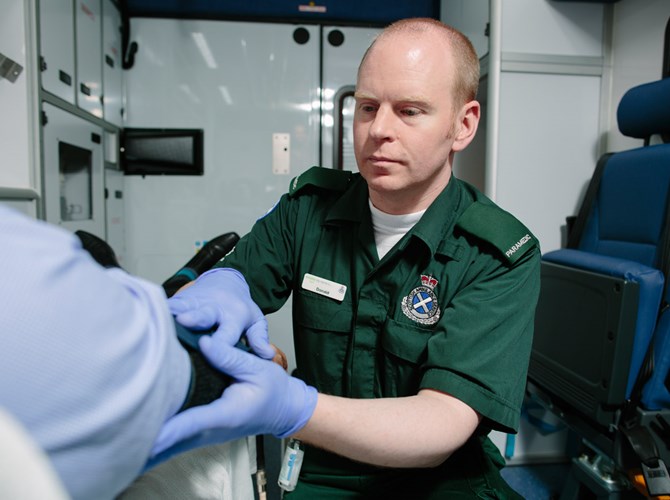Previous
Orthotist
To become a qualified paramedic, you'll need a degree in Paramedic Science. Pre-registration undergraduate degree programmes take 3 years, and postgraduate programmes take 2 years.
Paramedics use their critical thinking and dynamic decision-making skills to assess and manage a wide-ranging and unpredictable caseload safely and effectively.
The job commonly includes treating urgent or minor illnesses and providing an emergency response to medical and traumatic events. Paramedics often care for people in their own homes to help reduce avoidable hospital admissions.

The Health and Care Professions Council (HCPC) is a regulator of health and care professions in the UK. Paramedics must meet the professional standards required for their role and be registered with the HCPC to work in the NHS.
To become a paramedic, useful school subjects include:
Speak to your guidance teacher or careers adviser about subjects offered at your school.

You may find it helpful to get some healthcare experience by doing a work placement or volunteering. You’ll get training, increase your knowledge, and learn new skills. This could help you when applying for a college, university, or a new job with NHSScotland.
Most universities accept a wide range of qualifications, so you can apply directly from school or go to college first.
You may decide to do an HNC or HND in a health or science-based subject at college. You could then apply to university to do an undergraduate degree programme in Paramedic Science.
Search for college courses on My World of Work.
Widening participation supports adult learners who want to go to university. If you're an adult with few or no qualifications, you could get into higher education through the Scottish Wider Access Programme (SWAP).
Many universities also provide access programmes to help you get the degree entry qualifications you need.
To become a paramedic, you'll need to complete a 3-year full-time pre-registration degree programme at university.
In Scotland, 5 universities offer undergraduate programmes in Paramedic Science:
If you already have relevant qualifications and healthcare experience, you can do a master's in Paramedic Science. These courses usually take 2 years. The HCPC website provides information about approved pre-registration postgraduate programmes.
Find out more about HCPC-approved Paramedic Science degree programmes in Scotland.
At university, you'll have lectures, online learning activities, and clinical simulation training, where you'll learn the core skills you need. You'll also have practice placement opportunities with the Scottish Ambulance Service to prepare you for a career as a paramedic.
After graduation, you must register with the HCPC. You can then apply for newly qualified paramedic vacancies with the Scottish Ambulance Service.
Find out more about studying to become a paramedic. You can also search for Paramedic Science degree programmes on My World of Work.
The structured 12 to 18-month programme supports newly qualified graduate paramedics as they integrate into the Scottish Ambulance Service workforce.
During the programme, you'll apply your academic knowledge, skills, and placement experience while receiving clinical supervision. You'll be expected to record your learning experiences, including reflective practice and feedback, in a portfolio.
You’ll also complete an advanced emergency driving course. It will enable you to drive an emergency ambulance vehicle using blue lights.
The starting salary for newly qualified graduate paramedics is Agenda for Change band 5, progressing to band 6 when you complete the programme.
As a paramedic, you'll use your skills to assess the person's condition and manage their care safely and effectively. Incidents can include:
Find out more about working at the Scottish Ambulance Service.
In this role, you'll:
Some paramedics also support students on placement, providing clinical supervision, mentorship, training and skills development. Find out more about the role of an AHP practice educator.
You'll need these skills:
You'll also need a C1 driving licence and excellent driving skills.
You could work with:
You could work in:
Sometimes you'll work independently and reach the patient by using:
Depending on the nature of the emergency, you may need to call for backup from an ambulance crew or other emergency services.
You could work in a 2-person ambulance crew. You’ll assess and provide essential treatment to stabilise the patient. The patient can then be safely transferred to hospital or remain at home if they need to be referred to other health and social care services.
It is essential to keep in contact with the ambulance control room staff to provide location and status updates on the patient's condition. When the appropriate course of action has been decided, a handover to other healthcare professionals is required to maintain continuity of patient care.
During your career, you'll keep your knowledge and skills up to date using Continuing Professional Development (CPD). The College of Paramedics is one organisation that will provide you with opportunities to develop your clinical, educational, managerial, leadership, and research skills.
The Scottish Ambulance Service will also support you to keep your skills and knowledge up to date. It provides annual 'learning in practice' training opportunities with the service and other agencies, including the Scottish Fire and Rescue Service and NHS retrieval teams.
You could choose to join one of the specialist teams in the Scottish Ambulance Service:
With further training and experience, you could progress to clinical, education, or management roles.
When you become a qualified paramedic, you must register with the HCPC to work in the NHS. You can also join the College of Paramedics.

Discover the range of AHP careers you can choose in the NHS.
Allied health professions
Our blog includes how-to guides, case studies, and career resources.
Discover more